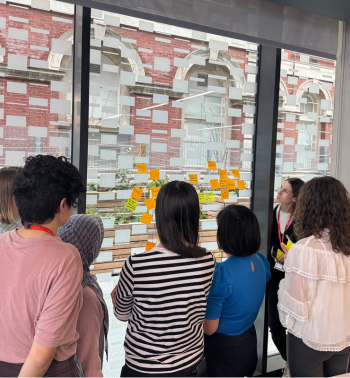6 May 2025
The King’s Health Partners Digital Health Hub (KHP DHH) is a collaborative initiative funded by the Engineering and Physical Sciences Research Council with an overarching goal to support and accelerate the development of effective, inclusive, and impactful digital health innovations.
It launched just over a year ago, with the mission to develop a multi-disciplinary eco-system through asynchronous online learning, provide expert advice, and bring together expertise across the health and care system, delivered by four teams: training; co-design; acceleration; and translation.
In the blog below Dr Emelia Delaney and Dr Lili Golmohammadi, from KHP DHH, reflect on the hub's co-design offerings to date, what the team has achieved, who they have worked with, what they have learned this year, and what’s next.
A year of co-design support in action
‘Co-design’ refers to the design of a product or service through the dynamic collaboration of those involved in the use of that product or service. Over the past year, the delivery of our co-design offerings has been a truly collaborative effort, drawing on the expertise of our own team, the wider DHH network, and our Patient and Public Involvement and Engagement (PPIE) group.
Our initial priority was to develop a suite of accessible, open-access, and asynchronous online resources to introduce key concepts of co-design for digital health. These include a short course, featuring lecture style videos offering an introduction to the foundations of co-design, how to get a digital health project started, and the four phases of the ‘Double Diamond’, where you can then test what you have learned via our multiple-choice questions.
The course is supported by a detailed methods library outlining co-design methods, which includes practical advice and case studies showcasing how these can be applied within a digital health context. The case study videos feature insights from PPIE members, experts, and healthcare professionals. Supported closely by out PPIE members, we have completed extensive rounds of development, and these resources were launched in September 2024. We continue to collect feedback from all our users, with plans to update our online resources in 2026.
Following the launch of these resources, we shifted our focus to our live offerings, which include one-to-one advice sessions and methods workshops. Our goal is to provide personalised co-design support for individuals embarking on their digital health journey and to demystify co-design methods, to ensure people have confidence when applying these practices themselves. These workshops have focused on overarching themes such as how to plan and facilitate co-design workshops, as well as specific methods such as interface prototyping. We’ve been lucky to partner with an incredible mix of contributors, from academic researchers to people with lived experience.
Together, we’ve hosted practical, engaging sessions, like our workshop on creating personas with Dr Timothy Neate (King’s College London), and a storytelling workshop with Dr Alison Thomson (Queen Mary University of London). Our PPIE members, Mel Getty and Paul Lennon, also shared their experiences of co-designing the SURE Recovery App in our sessions on planning and facilitating co-design workshops for digital health. Those who have benefited from our co-design support are working on a diverse range of digital health projects, including remote patient monitoring, simplifying medical imaging reports for patients, creating accessible immersive experiences for young patients, and developing alternatives to CT imaging for young adults with bone deformities.
What we have learned, and what’s next…
One year in, and we have collaborated and provided support to healthcare professionals, researchers, designers, PhD students, and PPIE members from across King’s Health Partners, all eager to explore co-design in digital health. Many were new to the process, and we’ve worked hard to fill that gap, providing resources, advice, and a growing network of support.
In our first year, we have delivered seven workshops (both online and in-person, attended by approx. 130 participants), provided nearly 40 one-to-one support sessions, and reached hundreds more through our online resources.
The network built through our events has been particularly encouraging and we are proud of the collaborative spirit that has emerged, something we hope to continue to nurture throughout the continuation of the KHP DHH until the end of the initial three-and-a-half year funded pilot in 2027 and beyond.
Looking ahead, we have so many exciting opportunities in the pipeline! For example, later in 2025 we will host a PPIE-led workshop, showcasing experiences of PPIE members’ journeys through co-design for digital health projects, and another workshop on rapid prototyping, hosted in the Engineering workshop situated at the Lambeth Wing of St Thomas’ Hospital. We also plan to bring new research to the fore, exploring the potential of Artificial Intelligence to support co-design activities, and the role of co-design in the King’s MedTech Accelerator programme (starting in July 2025). Finally, we will continue to expand and refine our accessible, online resources, building a sustainable platform dedicated to co-design for digital health.
If you would like to stay regularly updated with the DHH co-design offerings, please sign up to our newsletter. For more information on the KHP DHH, visit our webpage here.
Acknowledgements
We would like to thank PPIE member Mel Getty for her feedback on this blog post.





